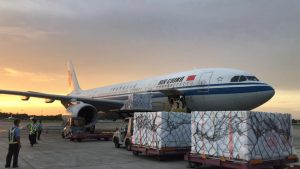China’s government today transferred more than $6 million to Myanmar’s military government to fund a range of development projects, in the latest sign that Beijing is accommodating itself to the junta that seized power in February.
According to a report in the state media agency Xinhua, the agreement was signed by Wunna Maung Lwin, the junta’s foreign minister, and Chinese Ambassador to Myanmar Chen Hai on Monday. The funds covered projects under Beijing’s Lancang-Mekong Cooperation framework in areas, including animal vaccines, agriculture, science, culture, tourism, and disaster prevention.
Despite being initially thrown off balance by the military’s surprise seizure of power on February 1, Beijing has regrouped and recalibrated its policy to the country’s changed circumstances. Where Western democracies have imposed a raft of targeted sanctions on the military junta and its key personnel, China has taken a more pragmatic approach.
The decisive shift toward de facto recognition was signaled in June, when Chinese officials began referring to coup leader Sen. Gen. Min Aung Hlaing as “the leader of Myanmar.”
As I’ve noted previously, this likely reflects a feeling in Beijing that despite the nationwide protests and unrest that have greeted the military takeover, the junta will remain in power for the foreseeable future. China therefore feels the need to come to terms with the country’s new reality in order to safeguard and advance its key strategic interests in the country, which center on developing markets for Chinese exports and creating an overland corridor from Yunnan province to the Indian Ocean.
The Chinese aid dispersal came as the U.S. government announced $50 million in aid to Myanmar, to help the country battle an explosive COVID-19 outbreak. In a stark contrast to China’s approach, none of this money will be going directly to the military authorities. Instead, the U.S. funding will be given directly to “international and non-governmental organization partners,” State Department spokesperson Ned Price said in a statement, in order to help them “provide emergency food assistance, lifesaving protection, shelter, essential health care, water, sanitation, and hygiene services to the people of Burma, including those who have fled from Burma or been displaced from their homes.”
Linda Thomas-Greenfield, the U.S. ambassador to the United Nations, announced the funding during a visit to Thailand yesterday, alongside $5 million in COVID-19 aid for Thailand. “This funding comes at a critical point of rising humanitarian needs and will help mitigate the impacts of COVID-19 on the lives of the people of both Thailand and Burma,” Price said. “In the wake of the February 1 coup, people from Burma continue to flee their homes due to ongoing violence.”
The U.S. aid is desperately needed, especially by the displaced people who will benefit from it. But its overall effect on the country’s COVID-19 crisis is likely to be limited, given Washington’s understandable reluctance (unlike Beijing) to engage directly with the Tatmadaw.
This points to a dilemma at the heart of the approach taken by those who are concerned about the deteriorating healthcare situation in Myanmar, yet also oppose any unnecessary engagement with the military. For example, the Special Advisory Council for Myanmar (SAC-M) last month issued a statement calling for an “urgent and massive” international humanitarian intervention in order to confront Myanmar’s COVID-19 outbreak.
In the statement, SAC-M member Chris Sidoti, a former member of the United Nations Fact-Finding Mission on Myanmar, said that the situation had “become a humanitarian disaster of such proportions that an international presence of health and medical personnel has become critical.”
At the same time, Yanghee Lee, another member of SAC-M, told an online press conference that the military government “must not be considered a partner for the delivery of aid.” Instead, the generals “should be recognized as murderers who will be held to account for their crimes.”
Unspoken was the possibility that these two aims might be mutually exclusive. Certainly, the grasping generals who are currently in control of the majority of Myanmar’s territory deserve to face justice for the calamitous loss of life and well-being that has resulted from their seizure of power.
At the same time, the people of Myanmar have a critical need for COVID-19 vaccines, personal protective equipment, and test kits. Given the junta’s effective control of Myanmar’s airspace and the country’s ethnic Burman heartland, any aid hoping to reach the bulk of the country’s population can’t avoid some form of interface with the military and its “caretaker government.”
While there are long-established channels for aid across the Thai border into southeastern Myanmar, these have limited reach into the central regions of the country. Their use for the mounting of a large-scale humanitarian aid effort would also require the consent and support of the Thai government – something that can’t be taken for granted, given its generally supine reaction to the Tatmadaw’s putsch.
The reality remains that the goals of aiding the people of Myanmar in their fight against COVID-19, and pursuing justice for the junta’s crimes and supporting the popular fight against military rule, presently remain in a considerable degree of tension. For those concerned about Myanmar’s entwined healthcare and politics crises, the most pressing question therefore is whether there is some half-way point of engagement that avoids both China’s open recognition of the military junta and the West’s present standoffishness.

































